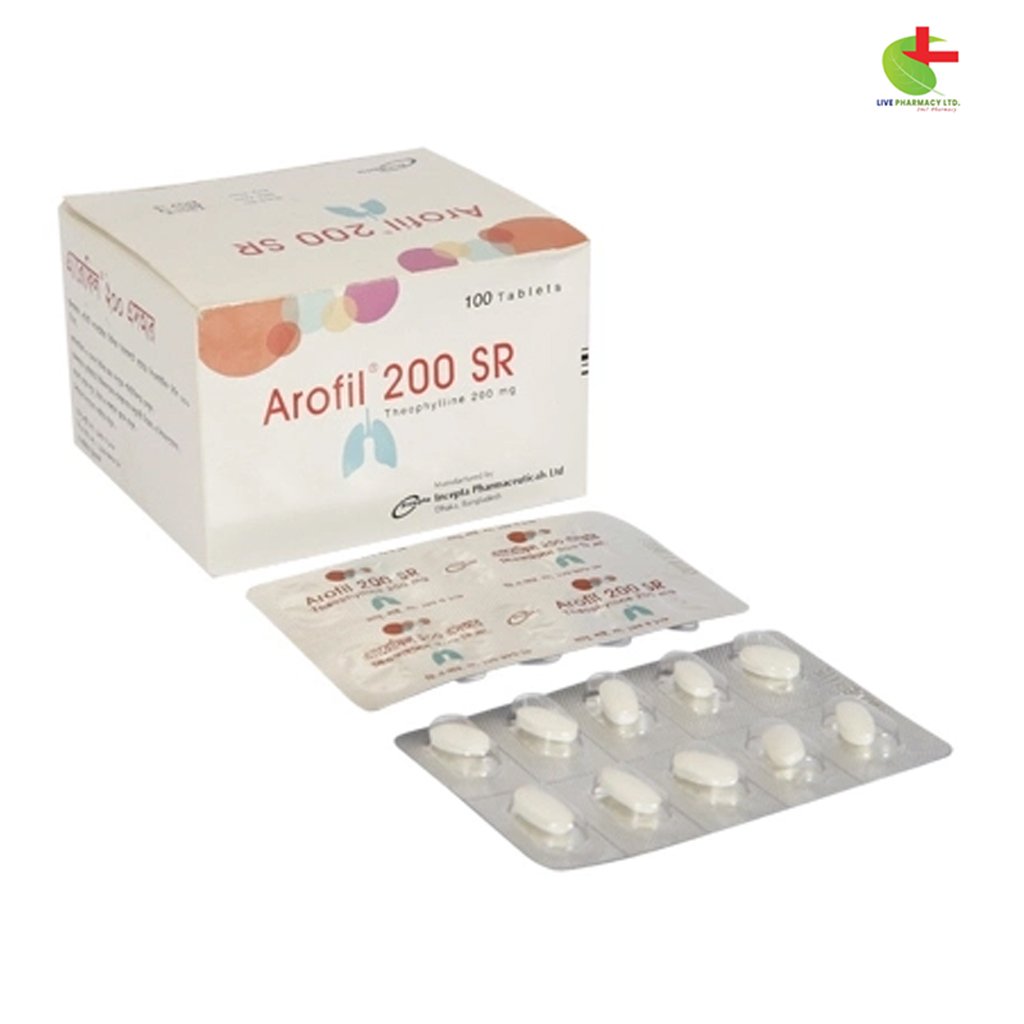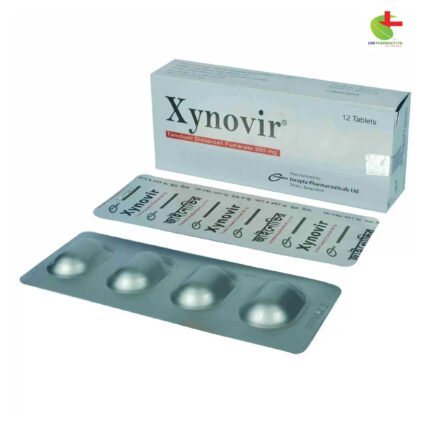Arofil 200 SR
16.00৳ Strip
- Arofil SR is a bronchodilator containing Theophylline.
- Used to treat acute and chronic asthma, COPD, and apnea in premature infants.
- Relaxes airway muscles and improves diaphragmatic function.
- Dosage is individualized and monitored through serum Theophylline concentrations.
- Always follow healthcare professional’s guidance for proper use.
 Brand
Brand
|
Incepta Pharmaceuticals Ltd |
|---|---|
 Generics
Generics
|
Theophylline |
Indications
Arofil SR is recommended for the treatment and management of various respiratory conditions, including:
- Acute asthma control
- Long-term management of chronic asthma (both symptomatic and prophylactic)
- Prevention of nocturnal asthma and early morning wheezing
- Chronic obstructive pulmonary disease (COPD), including chronic bronchitis and emphysema, and acute COPD exacerbations
- Treatment of apnea in premature infants
Please follow the guidance of a registered healthcare provider.
Pharmacology
Arofil SR contains Theophylline, a bronchodilator from the Methylxanthine class. Theophylline works by relaxing smooth muscles in the airways and reducing airway sensitivity to stimuli, which helps ease breathing. Additionally, it enhances diaphragmatic muscle contraction. Theophylline’s half-life is influenced by factors such as age, smoking habits, and liver function, typically ranging from 3 to 9 hours in adults with uncomplicated asthma.
Dosage & Administration
The dosage of Theophylline must be tailored to each patient’s needs, based on serum Theophylline concentrations. Most sustained-release forms are taken every 12 hours, though younger children with faster metabolism may require dosing every 8 hours. Recommended daily maintenance doses:
- Adults (16 years & older): 10 mg/kg/day (Max: 900 mg/day)
- Ages 12–15 years: 13 mg/kg/day
- Ages 9–11 years: 16 mg/kg/day
- Ages 1–8 years: 24–24 mg/kg/day
- Ages 6 months–1 year: 12–18 mg/kg/day
- Ages 1–6 months: 10 mg/kg/day
Please consult a healthcare professional for personalized dosage recommendations.
Interactions
- Not recommended: Do not use Arofil SR with other xanthine-containing medications.
- Increased clearance: Certain medications like barbiturates, carbamazepine, lithium, phenytoin, rifampicin, and sulphinpyrazone may reduce Arofil SR’s effectiveness, necessitating a higher dose.
- Decreased clearance: Medications such as allopurinol, cimetidine, ciprofloxacin, corticosteroids, erythromycin, and others may increase the serum levels of Theophylline, requiring a dose adjustment.
- Potentiation of hypokalemia: Use with beta-2 agonists, steroids, diuretics, and hypoxia can cause potassium imbalances; serum potassium should be regularly monitored.
Contraindications
Arofil SR should not be used by individuals who have a known hypersensitivity to Theophylline or any of its components.
Side Effects
Side effects are rare at standard dosages. However, they may include:
- Gastrointestinal discomfort
- Headaches
- Nausea
- Insomnia
- Hypotension
In children, CNS stimulation and diuresis may also occur.
Pregnancy & Lactation
- Pregnancy: It is not confirmed whether Theophylline can harm the fetus. Use only if the benefits outweigh the risks.
- Lactation: Theophylline is excreted in breast milk and may cause mild toxicity symptoms in infants. However, serious side effects are unlikely unless maternal Theophylline levels are excessively high.
Precautions & Warnings
Careful monitoring is essential for patients on Arofil SR, especially regarding drug interactions and physiological conditions that affect its clearance. Dosage adjustments may be needed based on individual patient response and follow-up assessments.
Use in Special Populations
- Pediatrics: Neonates have low clearance rates for Theophylline, requiring careful dosage management and monitoring of serum concentrations.
- Geriatrics: No significant differences in drug metabolism were noted in elderly patients, but adjustments may be required for other age-related factors like liver or kidney function.
Therapeutic Class
- Bronchodilators
- Theophylline and related medications
Storage Conditions
Store in a cool, dry place, away from light. Keep out of the reach of children.













Reviews
There are no reviews yet.